formerly eScholarship Editions


|
|
|
|
Your search for
'Medicine' in subject
found 76 book(s). | Modify Search | Displaying 61 - 76 of 76 book(s) | |
| 61. |  | Title: Taming the wind of desire: psychology, medicine, and aesthetics in Malay shamanistic performance Author: Laderman, Carol Published: University of California Press, 1991 Subjects: Anthropology | Asian Studies | Medical Anthropology | Psychology | Southeast Asia | Medicine Publisher's Description: Charged with restoring harmony and relieving pain, the Malay shaman places his patients in trance and encourages them to express their talents, drives, personality traits - the "Inner Winds" of Malay medical lore - in a kind of performance. These healing ceremonies, formerly viewed by Western anthropologists as exotic curiosities, actually reveal complex multicultural origins and a unique indigenous medical tradition whose psychological content is remarkably relevant to contemporary Western concerns.Accepted as apprentice to a Malay shaman, Carol Laderman learned and recorded every aspect of the healing seance and found it comparable in many ways to the traditional dramas of Southeast Asia and of other cultures such as ancient Greece, Japan, and India. The Malay seance is a total performance, complete with audience, stage, props, plot, music, and dance. The players include the patient along with the shaman and his troupe. At the center of the drama are pivotal relationships - among people, between humans and spirits, and within the self. The best of the Malay shamans are superb poets, dramatists, and performers as well as effective healers of body and soul. [brief] Similar Items |
| 62. | 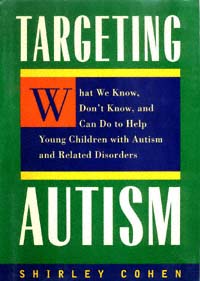 | Title: Targeting autism: what we know, don't know, and can do to help young children with autism and related disorders Author: Cohen, Shirley Published: University of California Press, 1998 Subjects: Sociology | Social Problems | Education | Psychology | Psychiatry | Medicine Similar Items |
| 63. | 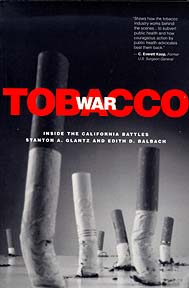 | Title: Tobacco war: inside the California battles Author: Glantz, Stanton A Published: University of California Press, 2000 Subjects: American Studies | California and the West | Public Policy | Politics | Social Problems | Economics and Business | Medicine | Environmental Studies | Sociology Publisher's Description: Tobacco War charts the dramatic and complex history of tobacco politics in California over the past quarter century. Beginning with the activities of a small band of activists who, in the 1970s, put forward the radical notion that people should not have to breathe second-hand tobacco smoke, Stanton Glantz and Edith Balbach follow the movement through the 1980s, when activists created hundreds of city and county ordinances by working through their local officials, to the present--when tobacco is a highly visible issue in American politics and smoke-free restaurants and bars are a reality throughout the state. The authors show how these accomplishments rest on the groundwork laid over the past two decades by tobacco control activists who have worked across the U.S. to change how people view the tobacco industry and its behavior. Tobacco War is accessibly written, balanced, and meticulously researched. The California experience provides a graphic demonstration of the successes and failures of both the tobacco industry and public health forces. It shows how public health advocates slowly learned to control the terms of the debate and how they discovered that simply establishing tobacco control programs was not enough, that constant vigilance was necessary to protect programs from a hostile legislature and governor. In the end, the California experience proves that it is possible to dramatically change how people think about tobacco and the tobacco industry and to rapidly reduce tobacco consumption. But California's experience also demonstrates that it is possible to run such programs successfully only as long as the public health community exerts power effectively. With legal settlements bringing big dollars to tobacco control programs in every state, this book is must reading for anyone interested in battling and beating the tobacco industry. [brief] Similar Items |
| 64. | 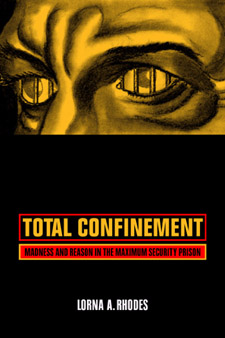 | Title: Total confinement: madness and reason in the maximum security prison Author: Rhodes, Lorna A. (Lorna Amarasingham) Published: University of California Press, 2004 Subjects: American Studies | Anthropology | Cultural Anthropology | Medical Anthropology | Ethnic Studies | Gender Studies | Medicine | Politics | Sociology Publisher's Description: In this rare firsthand account, Lorna Rhodes takes us into a hidden world that lies at the heart of the maximum security prison. Focusing on the "supermaximums" - and the mental health units that complement them - Rhodes conveys the internal contradictions of a system mandated to both punish and treat. Her often harrowing, sometimes poignant, exploration of maximum security confinement includes vivid testimony from prisoners and prison workers, describes routines and practices inside prison walls, and takes a hard look at the prison industry. More than an exposé, Total Confinement is a theoretically sophisticated meditation on what incarceration tells us about who we are as a society. Rhodes tackles difficult questions about the extreme conditions of confinement, the treatment of the mentally ill in prisons, and an ever-advancing technology of isolation and surveillance. Using her superb interview skills and powers of observation, she documents how prisoners, workers, and administrators all struggle to retain dignity and a sense of self within maximum security institutions. In settings that place in question the very humanity of those who live and work in them, Rhodes discovers complex interactions - from the violent to the tender - among prisoners and staff. Total Confinement offers an indispensable close-up of the implications of our dependence on prisons to solve long-standing problems of crime and injustice in the United States. [brief] Similar Items |
| 65. | 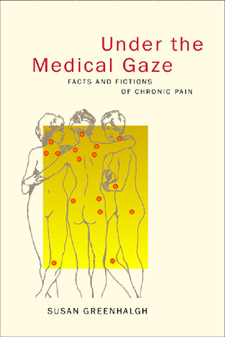 | Title: Under the medical gaze: facts and fictions of chronic pain Author: Greenhalgh, Susan Published: University of California Press, 2001 Subjects: Anthropology | Folklore and Mythology | Medical Anthropology | Physical Anthropology | Cultural Anthropology | Medicine | Gender Studies | Sociology | Social Problems | Social Problems Publisher's Description: This compelling account of the author's experience with a chronic pain disorder and subsequent interaction with the American health care system goes to the heart of the workings of power and culture in the biomedical domain. It is a medical whodunit full of mysterious misdiagnosis, subtle power plays, and shrewd detective work. Setting a new standard for the practice of autoethnography, Susan Greenhalgh presents a case study of her intense encounter with an enthusiastic young specialist who, through creative interpretation of the diagnostic criteria for a newly emerging chronic disease, became convinced she had a painful, essentially untreatable, lifelong muscle condition called fibromyalgia. Greenhalgh traces the ruinous effects of this diagnosis on her inner world, bodily health, and overall well-being. Under the Medical Gaze serves as a powerful illustration of medicine's power to create and inflict suffering, to define disease and the self, and to manage relationships and lives. Greenhalgh ultimately learns that she had been misdiagnosed and begins the long process of undoing the physical and emotional damage brought about by her nearly catastrophic treatment. In considering how things could go so awry, she embarks on a cogent and powerful analysis of the sociopolitical sources of pain through feminist, cultural, and political understandings of the nature of medical discourse and practice in the United States. She develops fresh arguments about the power of medicine to medicalize our selves and lives, the seductions of medical science, and the deep, psychologically rooted difficulties women patients face in interactions with male physicians. In the end, Under the Medical Gaze goes beyond the critique of biomedicine to probe the social roots of chronic pain and therapeutic alternatives that rely on neither the body-cure of conventional medicine nor the mind-cure of some alternative medicines, but rather a broader set of strategies that address the sociopolitical sources of pain. [brief] Similar Items |
| 66. | 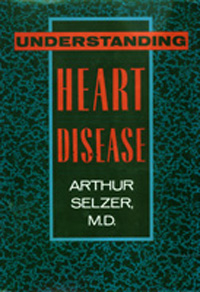 | Title: Understanding heart disease Author: Selzer, Arthur Published: University of California Press, 1992 Subjects: Medicine | Science Publisher's Description: Diseases of the heart are the leading cause of death in the Western world. Health professionals and the general public alike eagerly watch advances in the prevention, diagnosis, and treatment of heart disease. Yet the more spectacular aspects of medical progress in the field are often reported prematurely and their potential benefits exaggerated.Written in clear, accessible language, this book presents an authoritative and balanced picture of how heart diseases are recognized and managed. From his many years of experience, Dr. Selzer believes a well-informed patient can cooperate more successfully with a physician, and his book includes information vital to anyone confronting heart problems and cardiac emergencies. [brief] Similar Items |
| 67. | 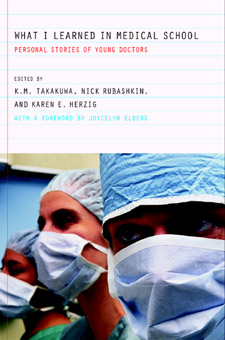 | Title: What I learned in medical school: personal stories of young doctors Author: Takakuwa, Kevin M Published: University of California Press, 2004 Subjects: Medicine | Sociology | Ethnic Studies | Gender Studies | Anthropology | Health Care Publisher's Description: Like many an exclusive club, the medical profession subjects its prospective members to rigorous indoctrination: medical students are overloaded with work, deprived of sleep and normal human contact, drilled and tested and scheduled down to the last minute. Difficult as the regimen may be, for those who don't fit the traditional mold - white, male, middle-to-upper class, and heterosexual - medical school can be that much more harrowing. This riveting book tells the tales of a new generation of medical students - students whose varied backgrounds are far from traditional. Their stories will forever alter the way we see tomorrow's doctors. In these pages, a black teenage mother overcomes seemingly insurmountable odds, an observant Muslim dons the hijab during training, an alcoholic hides her addiction. We hear the stories of an Asian refugee, a Mexican immigrant, a closeted Christian, an oversized woman - these once unlikely students are among those who describe their medical school experiences with uncommon candor, giving a close-up look at the inflexible curriculum, the pervasive competitive culture, and the daunting obstacles that come with being "different" in medical school. Their tales of courage are by turns poignant, amusing, eye-opening - and altogether unforgettable. [brief] Similar Items |
| 68. | 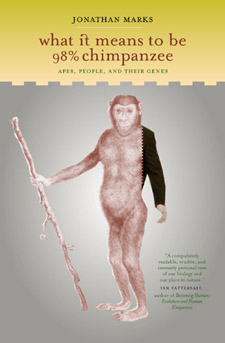 | Title: What it means to be 98% chimpanzee: apes, people, and their genes Author: Marks, Jonathan (Jonathan M.) 1955- Published: University of California Press, 2002 Subjects: EcologyEvolutionEnvironment | Evolution | Physical Anthropology | Sociology | Medicine | Mammalogy Publisher's Description: The overwhelming similarity of human and ape genes is one of the best-known facts of modern genetic sciencenm. But what does this similarity mean? Does it, as many have suggested, have profound implications for understanding human nature? Well-known molecular anthropologist Jonathan Marks uses the human-versus-ape controversy as a jumping-off point for a radical reassessment of a range of provocative issues--from the role of science in society to racism, animal rights, and cloning. Full of interesting facts, fascinating personalities, and vivid examples that capture times and places, this work explains and demystifies human genetic science--showing ultimately how it has always been subject to social and political influences and teaching us how to think critically about its modern findings. Marks presents the field of molecular anthropology--a synthesis of the holistic approach of anthropology with the reductive approach of molecular genetics--as a way of improving our understanding of the science of human evolution. As he explores the intellectual terrain of this field, he lays out its broad areas of interest with issues ranging from the differences between apes and humans to the biological and behavioral variations expressed in humans as a species. Marks confronts head-on the problems of racial classification in science. He describes current theories about race and uses work in primatology, comparative anatomy, and molecular anthropology to debunk them. He also sheds new light on the controversial Great Ape Project, the Human Genome Diversity Project, and much more. This iconoclastic, witty, and extremely readable book illuminates the deep background of human variation and asks us to reconsider the role of science in modern society. [brief] Similar Items |
| 69. | 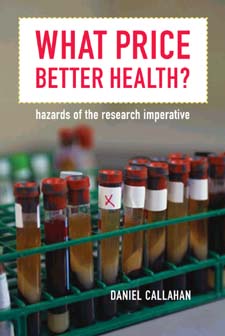 | Title: What price better health?: hazards of the research imperative Author: Callahan, Daniel 1930- Published: University of California Press, 2003 Subjects: Medicine | Philosophy | Public Policy Publisher's Description: The idea that we have an unlimited moral imperative to pursue medical research is deeply rooted in American society and medicine. In this provocative work, Daniel Callahan exposes the ways in which such a seemingly high and humane ideal can be corrupted and distorted into a harmful practice. Medical research, with its power to attract money and political support, and its promise of cures for a wide range of medical burdens, has good and bad sides - which are often indistinguishable. In What Price Better Health?, Callahan teases out the distinctions and differences, revealing the difficulties that result when the research imperative is suffused with excessive zeal, adulterated by the profit motive, or used to justify cutting moral corners. Exploring the National Institutes of Health's annual budget, the inflated estimates of health care cost savings that result from research, the high prices charged by drug companies, the use and misuse of human subjects for medical testing, and the controversies surrounding human cloning and stem cell research, Callahan clarifies the fine line between doing good and doing harm in the name of medical progress. His work shows that medical research must be understood in light of other social and economic needs and how even the research imperative, dedicated to the highest human good, has its limits. [brief] Similar Items |
| 70. | 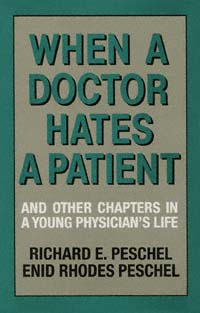 | Title: When a doctor hates a patient, and other chapters in a young physician's life Author: Peschel, Richard E Published: University of California Press, 1988 Subjects: Medicine | Science Similar Items |
| 71. | 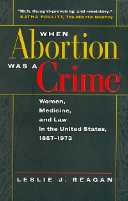 | Title: When abortion was a crime: women, medicine, and law in the United States, 1867-1973 Author: Reagan, Leslie J Published: University of California Press, 1997 Subjects: History | Women's Studies | United States History | Medicine Publisher's Description: As we approach the 30th anniversary of Roe v. Wade , it's crucial to look back to the time when abortion was illegal. Leslie Reagan traces the practice and policing of abortion, which although illegal was nonetheless widely available, but always with threats for both doctor and patient. In a time when many young women don't even know that there was a period when abortion was a crime, this work offers chilling and vital lessons of importance to everyone.The linking of the words "abortion" and "crime" emphasizes the difficult and painful history that is the focus of Leslie J. Reagan's important book. Her study is the first to examine the entire period during which abortion was illegal in the United States, beginning in the mid-nineteenth century and ending with Roe v. Wade in 1973. Although illegal, millions of abortions were provided during these years to women of every class, race, and marital status. The experiences and perspectives of these women, as well as their physicians and midwives, are movingly portrayed here.Reagan traces the practice and policing of abortion. While abortions have been typically portrayed as grim "back alley" operations, she finds that abortion providers often practiced openly and safely. Moreover, numerous physicians performed abortions, despite prohibitions by the state and the American Medical Association. Women often found cooperative practioners, but prosecution, public humiliation, loss of privacy, and inferior medical care were a constant threat.Reagan's analysis of previously untapped sources, including inquest records and trial transcripts, shows the fragility of patient rights and raises provocative questions about the relationship between medicine and law. With the right to abortion again under attack in the United States, this book offers vital lessons for every American concerned with health care, civil liberties, and personal and sexual freedom. [brief] Similar Items |
| 72. | 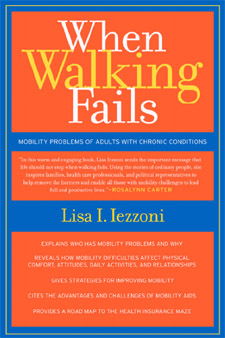 | Title: When walking fails: mobility problems of adults with chronic conditions Author: Iezzoni, Lisa I Published: University of California Press, 2003 Subjects: Medicine | Health Care | Sociology | Public Policy Publisher's Description: Roughly one in ten adult Americans find their walking slowed by progressive chronic conditions like arthritis, back problems, heart and lung diseases, and diabetes. In this passionate and deeply informed book, Lisa I. Iezzoni describes the personal experiences of and societal responses to adults whose mobility makes it difficult for them to live as they wish - partly because of physical and emotional conditions and partly because of persisting societal and environmental barriers. Basing her conclusions on personal experience, a wealth of survey data, and extensive interviews with dozens of people from a wide social spectrum, Iezzoni explains who has mobility problems and why; how mobility difficulties affect people's physical comfort, attitudes, daily activities, and relationships with family and friends throughout their communities; strategies for improving mobility; and how the health care system addresses mobility difficulties, providing and financing services and assistive technologies. Iezzoni claims that, although strategies exist to improve mobility, many people do not know where to turn for advice. She addresses the need to inform policymakers about areas where changes will better accommodate people with difficulty walking. This straightforward and engaging narrative clearly demonstrates that improving people's ability to move freely and independently will enhance overall health and quality of life, not only for these persons, but also for society as a whole. [brief] Similar Items |
| 73. | 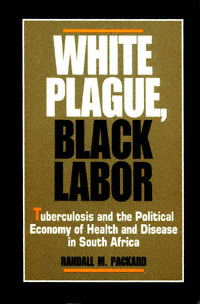 | Title: White plague, black labor: tuberculosis and the political economy of health and disease in South Africa Author: Packard, Randall M 1945- Published: University of California Press, 1989 Subjects: Anthropology | Medicine | Medical Anthropology | African Studies | Politics Publisher's Description: Why does tuberculosis, a disease which is both curable and preventable, continue to produce over 50,000 new cases a year in South Africa, primarily among blacks? In answering this question Randall Packard traces the history of one of the most devastating diseases in twentieth-century Africa, against the background of the changing political and economic forces that have shaped South African society from the end of the nineteenth century to the present. These forces have generated a growing backlog of disease among black workers and their families and at the same time have prevented the development of effective public health measures for controlling it. Packard's rich and nuanced analysis is a significant contribution to the growing body of literature on South Africa's social history as well as to the history of medicine and the political economy of health. [brief] Similar Items |
| 74. | 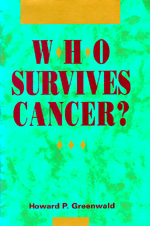 | Title: Who survives cancer? Author: Greenwald, Howard P Published: University of California Press, 1992 Subjects: Sociology | Environmental Studies | Medicine Publisher's Description: FACT OR FICTION? *A white male earning over $35,000 a year has a better chance of surviving most types of cancer than an unemployed African-American male.*Psychological factors predispose people to contracting cancer and improved emotional health promotes recovery.*Early detection is useless in curing cancer.*Experimental, not conventional, treatments offer the most benefits and longer survival rates to cancer patients.*A scientific breakthrough of practical and immediate significance in cancer treatment is imminent.*Cancer prevention is ineffective in many areas and campaigns will probably never achieve a reduction of cancer mortality approaching 50 percent.*Health Maintenance Organizations (HMOs) increase survival chances for most cancer patients.Howard Greenwald takes an incisive new look at how class, race, sex, psychological state, type of health care and available treatments affect one's chance of surviving cancer. Drawing on an original ten-year survival study of cancer patients, he synthesizes medical, epidemiological, and psychosocial research in a uniquely interdisciplinary and eye-opening approach to the question of who survives cancer and why.Scientists, health care professionals, philanthropists, government agencies, and ordinary people all agree that significant resources must be allocated to fight this dreaded disease. But what is the most effective way to do it? Greenwald argues that our priorities have been misplaced and calls for a fundamental rethinking of the way the American medical establishment deals with the disease. He asserts that the emphasis on prevention and experimental therapy has only limited value, whereas the availability of conventional medical care is very important in influencing cancer survival. Class and race become strikingly significant in predicting who has access to health care and can therefore obtain medical treatment in a timely, effective manner. Greenwald counters the popular notion that personality and psychological factors strongly affect survival, and he underscores the importance of early detection. His research shows that Health Maintenance Organizations, while sometimes prone to delays, offer low-income patients a better chance of ultimate survival. Greenwald pleads for immediate attention to the inadequacies and inequalities in our health care delivery system that deter patients from seeking regular medical care.Instead of focusing on research and the hope for a breakthrough cure, Greenwald urges renewed emphasis on ensuring available health care to all Americans. In its challenge to the thrust of much biomedical research and its critique of contemporary American health care, as well as in its fresh and often counterintuitive look at cancer survival, Who Survives Cancer? is invaluable for policymakers, health care professionals, and anyone who has survived or been touched by cancer. [brief] Similar Items |
| 75. | 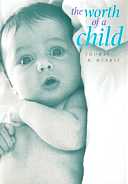 | Title: The worth of a child Author: Murray, Thomas H 1946- Published: University of California Press, 1996 Subjects: Philosophy | Ethics | Medicine | Social Problems | Public Policy Publisher's Description: Thomas Murray's graceful and humane book illuminates one of the most morally complex areas of everyday life: the relationship between parents and children. What do children mean to their parents, and how far do parental obligations go? What, from the beginning of life to its end, is the worth of a child?Ethicist Murray leaves the rarefied air of abstract moral philosophy in order to reflect on the moral perplexities of ordinary life and ordinary people. Observing that abstract moral terms such as altruism and selfishness can be buried in the everyday doings of families, he maintains that ethical theory needs a richer description than it now has of the moral life of parents and children. How far should adults go in their quest for children? What options are available to women who do not want to bear a child now? Should couples be allowed to reject a child because of genetic disability or "wrong" gender? How can we weigh the competing claims of the genetic and the rearing parents to a particular child? The Worth of a Child couples impressive learning with a conversational style. Only by getting down to cases, Murray insists, can we reach moral conclusions that are unsentimental, farsighted, and just. In an era of intense public and private acrimony about the place and meaning of "family values," his practical wisdom about extraordinary difficult moral issues offers compelling reading for both experienced and prospective parents, as well as for ethicists, social and behavioral scientists, and legal theorists. [brief] Similar Items |
| 76. | 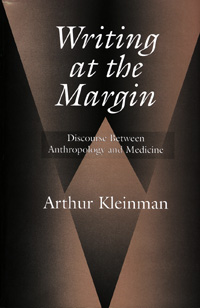 | Title: Writing at the margin: discourse between anthropology and medicine Author: Kleinman, Arthur Published: University of California Press, 1997 Subjects: Anthropology | Medical Anthropology | Sociology | Medicine | Asian Studies | Social Problems Publisher's Description: One of the most influential and creative scholars in medical anthropology takes stock of his recent intellectual odysseys in this collection of essays. Arthur Kleinman, an anthropologist and psychiatrist who has studied in Taiwan, China, and North America since 1968, draws upon his bicultural, multidisciplinary background to propose alternative strategies for thinking about how, in the postmodern world, the social and medical relate. Writing at the Margin explores the border between medical and social problems, the boundary between health and social change. Kleinman studies the body as the mediator between individual and collective experience, finding that many health problems - for example the trauma of violence or depression in the course of chronic pain - are less individual medical problems than interpersonal experiences of social suffering. He argues for an ethnographic approach to moral practice in medicine, one that embraces the infrapolitical context of illness, the responses to it, the social institutions relating to it, and the way it is configured in medical ethics.Previously published in various journals, these essays have been revised, updated, and brought together with an introduction, an essay on violence and the politics of post-traumatic stress disorder, and a new chapter that examines the contemporary ethnographic literature of medical anthropology. [brief] Similar Items |